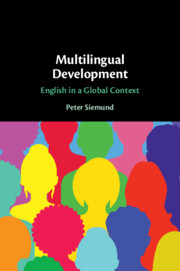48 results
Acknowledgements
-
- Book:
- Multilingual Development
- Published online:
- 17 January 2023
- Print publication:
- 05 January 2023, pp xviii-xix
-
- Chapter
- Export citation
1 - Multilingualism
-
- Book:
- Multilingual Development
- Published online:
- 17 January 2023
- Print publication:
- 05 January 2023, pp 1-43
-
- Chapter
- Export citation
6 - The New Englishes in Their Multilingual Ecologies
-
- Book:
- Multilingual Development
- Published online:
- 17 January 2023
- Print publication:
- 05 January 2023, pp 179-226
-
- Chapter
- Export citation

Multilingual Development
- English in a Global Context
-
- Published online:
- 17 January 2023
- Print publication:
- 05 January 2023
Copyright page
-
- Book:
- Multilingual Development
- Published online:
- 17 January 2023
- Print publication:
- 05 January 2023, pp iv-iv
-
- Chapter
- Export citation
About the Author
-
- Book:
- Multilingual Development
- Published online:
- 17 January 2023
- Print publication:
- 05 January 2023, pp xx-xx
-
- Chapter
- Export citation
Contents
-
- Book:
- Multilingual Development
- Published online:
- 17 January 2023
- Print publication:
- 05 January 2023, pp vii-x
-
- Chapter
- Export citation
Tables
-
- Book:
- Multilingual Development
- Published online:
- 17 January 2023
- Print publication:
- 05 January 2023, pp xiv-xvi
-
- Chapter
- Export citation
2 - On Advantages and Effects of Multilingual Development
-
- Book:
- Multilingual Development
- Published online:
- 17 January 2023
- Print publication:
- 05 January 2023, pp 44-63
-
- Chapter
- Export citation
Figures
-
- Book:
- Multilingual Development
- Published online:
- 17 January 2023
- Print publication:
- 05 January 2023, pp xi-xiii
-
- Chapter
- Export citation
Index
-
- Book:
- Multilingual Development
- Published online:
- 17 January 2023
- Print publication:
- 05 January 2023, pp 283-290
-
- Chapter
- Export citation
Preface
-
- Book:
- Multilingual Development
- Published online:
- 17 January 2023
- Print publication:
- 05 January 2023, pp xvii-xvii
-
- Chapter
- Export citation
3 - Cross-Linguistic Influence
-
- Book:
- Multilingual Development
- Published online:
- 17 January 2023
- Print publication:
- 05 January 2023, pp 64-95
-
- Chapter
- Export citation
References
-
- Book:
- Multilingual Development
- Published online:
- 17 January 2023
- Print publication:
- 05 January 2023, pp 254-282
-
- Chapter
- Export citation
5 - Multilingual Language Policies, Identities, and Attitudes
-
- Book:
- Multilingual Development
- Published online:
- 17 January 2023
- Print publication:
- 05 January 2023, pp 148-178
-
- Chapter
- Export citation
4 - Language Development in Multilingual Settings
-
- Book:
- Multilingual Development
- Published online:
- 17 January 2023
- Print publication:
- 05 January 2023, pp 96-147
-
- Chapter
- Export citation
7 - Patterns and Limits of Multilingualism
-
- Book:
- Multilingual Development
- Published online:
- 17 January 2023
- Print publication:
- 05 January 2023, pp 227-253
-
- Chapter
- Export citation
Epigraph
-
- Book:
- Multilingual Development
- Published online:
- 17 January 2023
- Print publication:
- 05 January 2023, pp v-vi
-
- Chapter
- Export citation
9 - Are Multilinguals the Better Academic ELF Users?
- from Part II - Zooming in on ELF
-
-
- Book:
- Language Change
- Published online:
- 17 December 2020
- Print publication:
- 03 December 2020, pp 234-266
-
- Chapter
- Export citation
The emergence of English reflexive verbs: an analysis based on the Oxford English Dictionary1
-
- Journal:
- English Language & Linguistics / Volume 18 / Issue 1 / March 2014
- Published online by Cambridge University Press:
- 06 February 2014, pp. 49-73
-
- Article
- Export citation



